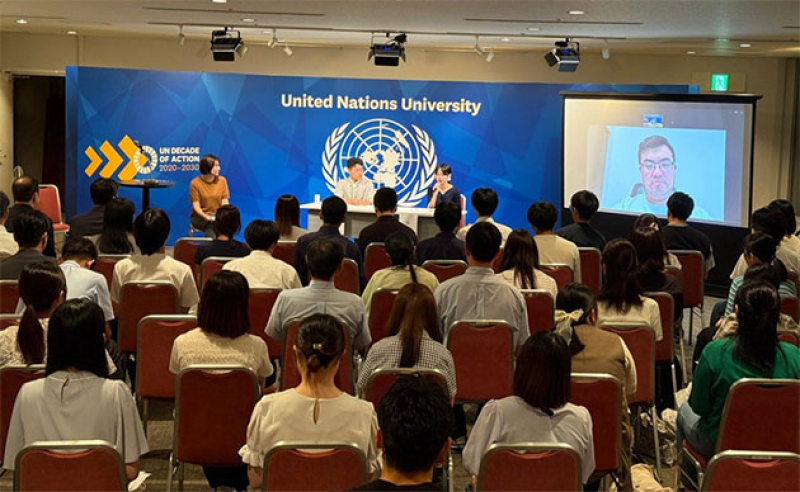- World Cup ticket prices to start at $60, may rise to $6,730 |
- Gazipur kitchen market fire under control after one hour |
- 10 MNC to enter bourse; Dhaka Stock Brookers laud BSEC |
- Dhaka bourse sees highest turnover in 12 months |
- Xi unveils vision for equitable global governance, rejects unilateralism |
Youth Mobilize Globally to Support Hibakusha on UN Day

Marking the United Nations’ International Day Against Nuclear Tests, young activists and experts gathered at the UN University in Tokyo for an event titled “The Role of Youth in Supporting Global Hibakusha.” The forum highlighted how youth solidarity can amplify the voices of survivors of nuclear testing and bombings—collectively known as the Global Hibakusha, from Hiroshima to the Marshall Islands—and strengthen global momentum toward nuclear abolition.
The event combined discussion and advocacy, emphasizing that the nuclear age is not only history but a present crisis. Young people, organizers stressed, must carry these voices forward.
The forum was convened by five advocacy groups: International Physicians for the Prevention of Nuclear War (IPPNW), Qazaq Nuclear Frontline Coalition, Soka Gakkai International (SGI), Friedrich-Ebert-Stiftung (FES) Kazakhstan, and the Marshallese Educational Initiative (MEI). They presented the final results of a Youth Peace Awareness Survey conducted from January 6 to August 9 across the US, Australia, Kazakhstan, Japan, and the Marshall Islands. The survey involved 1,580 participants aged 18 to 35, examining their knowledge, attitudes, and readiness to act on nuclear issues.
“In every country surveyed, those who had heard survivor testimony were more likely to take action for nuclear abolition,” said Daiki Nakazawa of SGI Youth. Momoka Abe added that survivor accounts remain a powerful way to understand both the human cost of nuclear weapons and the urgency of prevention.
A live online dialogue connected Tokyo with Almaty, Kazakhstan. Medet Suleimen of FES Kazakhstan recounted the country’s tragic legacy: 456 nuclear tests at Semipalatinsk affected 1.5 million people. Though the site closed in 1991, the human suffering continues.
Japanese youth also reflected on nuclear harm beyond Hiroshima and Nagasaki. Yuki Nihei recounted hearing testimony from an Indigenous Australian affected by British nuclear tests. “Hearing from Global Hibakusha shows that nuclear harm is present-tense. Many people are still suffering now,” she said, inspiring her commitment to genuine nuclear abolition.
The forum also addressed the Treaty on the Prohibition of Nuclear Weapons (TPNW), which obligates states to assist victims and remediate environmental harm. Challenges remain, including the refusal of nuclear-armed states to join, tensions between governments and NGOs, and limited resources in the Global South.
Kazakhstan’s Anvar Milzatillayev highlighted the need for accessible, participatory campaigns to translate awareness into action, praising the “three powers of youth”—spreading the truth, connecting across borders, and mobilizing society—to support the Global Hibakusha and build a nuclear-free future.
Professor Tshilidzi Marwala, Rector of the United Nations University, called on future generations to act with foresight and courage, renewing the UN’s pledge “to save succeeding generations from the scourge of war.”

